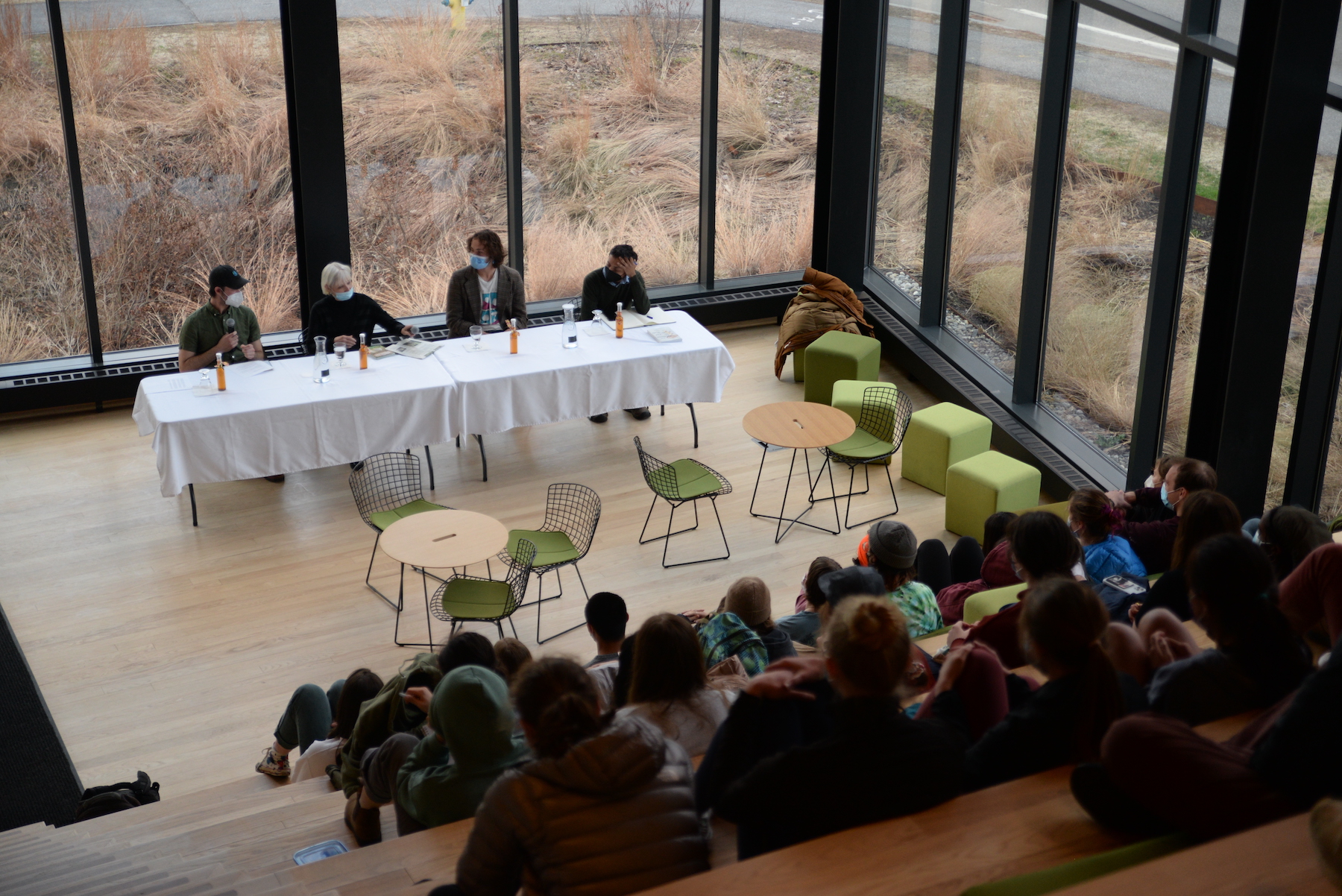Mycorrhizal Minds panelists discuss their passion for mushrooms
April 22, 2022
 Cora Dow
Cora DowBeyond the taste of Thorne’s Hungarian mushroom soup, or the power of psychedelic fungi, mushrooms offer insight into the power of interconnection.
On Tuesday evening, students filled the Roux Lantern for the Mycorrhizal Minds Lecture presented by the Bowdoin Organic Garden. The panel, guided by Senior Classroom Technology Engineer Michael Delola, consisted of Gary M. Pendy Professor of Social Sciences Jean Yarbrough, Assistant Professor of Anthropology Shreyas Sreenath and Benjamin Felser ’22.
This talk was the first of two parts of “Mushroom Fest.” The second part, the Earth Day Fair, is today from 1:00-4:30 p.m. on Main Quad.
The discussion covered a multitude of topics: the future of fungi amidst climate and agricultural threats, how human relationships with mushrooms reflect larger themes of environmental engagement and the intricacies of foraging in Maine, to name a few.
The event was emceed by Lucie Nolden ’22, a representative of the Bowdoin Organic Garden, who emphasized a goal of considering mushrooms beyond ecological understanding.
“I wanted to keep [the discussion] open [and] keep it interdisciplinary because mushrooms can mean so many things. To have people on the panel from all different angles, I wanted to value all of those perspectives and keep it very democratic,” Nolden said.
Amidst the diversity in the panelist’s consideration of fungi, they all shared a curiosity for the illuminating power of foraging. As an active forager for 15 years, Yarborough explained the simultaneously challenging and rewarding nature of the activity.
“I don’t think it’s wise to go in with the expectation that in a year from now, you’ll be able to serve 16 different kinds of mushrooms. Don’t think you’re going to master this in one season,” Yarbrough said. “But every single one you find is really incredible that there’s just no other way to describe it.”
During the talk, Yarborough shared how foraging can be a highly secretive activity.
“I won’t tell people where I found my mushrooms, because it’s a risky business,” Yarbrough said. “But I give them away in great quantities. And you will be amazed how happy people are to be handed just a bag of black trumpets. It just makes everybody so happy that I can’t resist doing it.”
Delola agreed, saying he was motivated to both protect the locations of fungi he had worked so hard to find and share his passion. This past summer, a uniquely bountiful season evoked a particularly strong enthusiasm to involve friends.
“I got to a point where I was showing other people where they were. I was like, ‘Hey, you want to eat this? You want to check this out?’ I had such an overabundance that all of my competitive nature was gone,” Delola said.
While Delola shared fond memories of making his first foraged meal for friends and family, Felser described the evolutionary significance of fungi as an anchor of ecological dependence.
“Without these fungi, we wouldn’t have the plants that we have right now. They’re fundamental to their evolution, and also to their existence and everything that they offer us and everything that we offer them,” Felser said.
Sreenath approached the connective power of mushrooms as a self-proclaimed interloper on the panel: not a forager, but an anthropologist who’s interested in mushroom enthusiasts and how their relationship to fungi illuminates themes surrounding resource extraction.
“When your entire labor is premised on finding fungi and extracting it without thinking about the consequences of this reproduction, that is a very eerie, unique place that we found ourselves as human beings,” Sreenath said.
In addressing this issue of resource extraction, Sreenath suggests we can learn from fungi.
“I think it’s up to all of us to think of a more relational way of approaching foraging. This simple activity can enable us to think about a profound way to get out of the system that we’re in right now, which is premised on endless resource extraction,” Sreenath said. “The relationship between foragers and mycologists, and the fungi that they observe, that they pick and they eat, mimics—or I think it should aspire to mimic—the relationship that fungi have with their plant and tree hosts.”
Throughout the night, the panelists expressed a curiosity to further their knowledge. Felser expressed how a study of fungi not only provides ecological knowledge, but deeper understandings as well.
“By learning how to read mushrooms, we can learn how to read a little bit more of what is happening in the forest, what’s around us,” Felser said.

Comments
Before submitting a comment, please review our comment policy. Some key points from the policy: